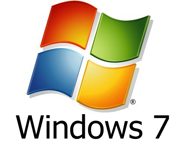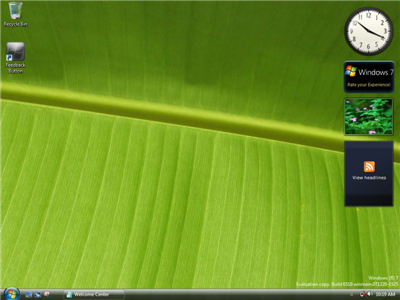 Just when you thought that things probably couldn’t get worse for Windows, Windows 7 looms on the horizon. Due to be released sometime in 2010, it’s supposed to be the next big Windows evolution (Hmm, where have I heard that before?). As Tom reported last week, Microsoft have announced that within 40 days Windows XP will no longer be on sale. I read about this in utter amazement in view of the numerous compatibility problems Vista has had and the disappointing reception it’s been given by the public. It’s almost as if Microsoft are taking a gun to users’ heads and saying, “Right, you’re going to like Vista or else so just buy it and shut-up!” and putting to death one of their more successful operating system.
Just when you thought that things probably couldn’t get worse for Windows, Windows 7 looms on the horizon. Due to be released sometime in 2010, it’s supposed to be the next big Windows evolution (Hmm, where have I heard that before?). As Tom reported last week, Microsoft have announced that within 40 days Windows XP will no longer be on sale. I read about this in utter amazement in view of the numerous compatibility problems Vista has had and the disappointing reception it’s been given by the public. It’s almost as if Microsoft are taking a gun to users’ heads and saying, “Right, you’re going to like Vista or else so just buy it and shut-up!” and putting to death one of their more successful operating system.
As Tom pointed out, Windows XP was a genuine improvement on earlier versions of Windows which felt tinpot in comparison. XP felt and looked more solid, crashed less often and was generally much more intuitive to use. Vista offered none of that – in fact, I’d argue that in trying to be clever and changing age-old Windows descriptions here and there, in some areas they’ve actually succeeded in making it more difficult and annoying to use in places. That’s not to mention the frustrating incompatibility issues and the fact that it hogs at least 512MB of RAM. Anyone buying a new PC which boasts a huge amount of RAM thrown in should bear in mind that Vista will occupy a significant proportion of it – a ludicrous situation considering it’s just an operating system not an application!

The big question now is will Windows 7 be what Vista should have been? If initial news is anything to go by, then the answer is almost certainly not and might even give those home users wondering whether to change to Mac even more reason to do so. One look at one of the preliminary screenshots (above) to come out of Windows 7 and the word “Vista” springs immediately to mind. Aesthetically, there look to be few improvements and Bill Gates has made no secret of the fact that any “enhancements” will basically be ironing out those issues that Vista has been saddled with saying Windows 7 will have:
The ability to be lower power, take less memory, be more efficient, and have lots more connections up to the mobile phone, so those scenarios connect up well to make it a great platform for the best gaming that can be done, to connect up to the thing being done out on the Internet, so that, for example, if you have two personal computers, that your files automatically are synchronized between them, and so you don’t have a lot of work to move that data back and forth.
However what Gates fails to add is that Windows 7 will not be binary compatible with previous versions of Windows – so if you think you’ve experienced some serious program compatibility issues with Windows Vista, you ain’t seen nothing yet. In a way, the fact they are, to a large extent, building Windows from the ground upwards again is a good thing because it’s the limited and archaic code that Windows uses that makes it so clunky. In particular, as Windows 7 news points out:
Vista stores multiple copies of core system libraries, as each revision of a library typically adds/removes functions, and applications compiled with dynamic links to a specific version of a DLL file may call on functions not present in the currently installed library. On the average system, this directory can be several gigabytes in size, with much of the code duplicated between the separate versions many times.
If Microsoft don’t radically innovate and come-up with something that’s a genuine enhancement to Windows XP by the time Windows 7 comes around, there will be a growing number of users and businesses that switch to Mac or even Linux, in the hunt for an operating system that does its job swiftly, quickly and elegantly.

